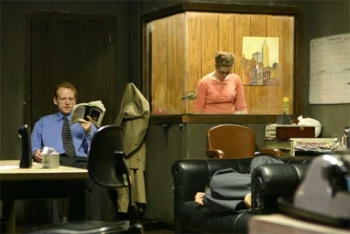
- San Francisco Chronicle February 14, 2020
- The Times of London May 10, 2012
- The New York Times December 16, 2010
- The New Yorker September 27, 2010
- New York Magazine October 6, 2010
- The New York Times October 6, 2010
- The New York Times February 5, 2010
- The Boston Globe May 15, 2009
- The Sydney Morning Herald December 28, 2009
- The Sydney Morning Herald May 19, 2009
- The Chicago Tribune November 17, 2008
- Time Out Chicago November 13-19, 2008
- Chicago Sun-Times November 15, 2008
- The Irish Times October 4, 2008
- The Independent October 3, 2008
- Irish Times September 29, 2008
- ArtForum: Best of 2007 December 1, 2007
- The New York Times Magazine December 9, 2007
- The New York Times September 16, 2007
- The Village Voice September 12-18, 2007
- Publico July 4, 2007
- Die Presse June 17, 2007
- Klassekampen December 12, 2006
- Variety October 1, 2006
- Neue Zürcher Zeitung August 28, 2006
- Landboote August 28, 2006
- Tages-Anzeiger August 28, 2006
- The New York Times July 16, 2006
- Het Parool June 16,2006
- 8Weekly June 16, 2006
- Trouw June 16, 2006
- Walker Art Center interview June 8, 2006
- NRC Handelsblad June 2, 2006
- De Volkskrant May 29, 2006
- Le Soir May 24, 2006
- Yale Alumni Magazine November/December 2005
Technical, Classical Brilliance Opens Festival
by Jim McCaffrey
(excerpted)
“Gatz,” presented by New York’s Elevator Repair Service, is a production people will talk about for many, many years.
It is on the simplest level a literal, line-by-line complete reading of F. Scott Fitzgerald’s The Great Gatsby. The company adds the conceit that a man working in a dingy office, probably in New York, one day comes to work, can’t get his computer to work and so begins reading Gatsbyout loud.
While this may seem thin in the tradition of great theater, it is much more than any description will convey.
Those of you who have seen the film “Vanya” on 42nd Street will understand immediately the concept of “Gatz.”
Director John Collins started rehearsing “Gatz” in 1999. The more he worked with his cast on the script, the more he was certain he wanted to use every word of Fitzgerald’s novel.
The company had problems getting the estate’s permission to use the entire text of The Great Gatsby in a production. Collins put the delay to good use. The company continued to rehearse for love of their craft and because they became enamored with the text.
The result is a revelatory deconstruction of Fitzgerald that points out much of the hokum in the writing, while compassionately transforming it into a revelatory humor.
It seems no member of the cast meets Fitzgerald’s description of his characters. Nick is short and red haired, Daisy is lithe, but a brunette, Tom looks and acts like the Dunkin’ Donuts man on a diet, round with a face dominated by a black mustache.
Yet the cast is taut as a virtuoso’s violin string as it brings layers of nuance and remembered, unnoticed, intended and unintended meaning to the text.
Their interpretation telescopes the audience from small intimacy – the feeling of experiencing rather than just knowing Nick and Daisy and Tom and Jay’s feelings – to the large, omniscient knowledge of the pending tragedy, back to the personal feeling of interaction when actors wink and let the audience in on the discoveries they made through their close reading of the text, and back out to the satisfying, slightly snobbish, entirely Gatsby feeling of being in on jokes Fitzgerald never imagined.
In the contemporary America of haves and have-nots, where East Coast Ivy League-educated elites direct the country into disasters without analyzing the costs and consequences of their actions, Gatsby takes on a revelatory meaning and relevance for our times.
This performance held the audience’s complete attention for 7.5 hours. During the three 10-minute breaks and one-hour intermission for a meal, the audience remained enthralled with the storytelling, anxious to retake their seats to hear more of the oft-told tale.
But glory belonged not to the actors alone. This company, like MacLaughlin’s company the night before, worked as a seamless whole.
Collins’ direction made full use of Louisa Thompson’s imaginative set design, relying heavily on Mark Barton’s chilling lighting design while gleefully incorporating Ben Williams’ memorable sound design. These production values, for all their considerable demonstration of professional prowess, just managed to keep up with the cast’s incredible dedication, discipline, athleticism, stamina and talent.
“Gatz” is one of those I-Was-There productions that only live performance art can give to an audience.
For every individual there, what “Gatz” is will be measured by its ability to grow in importance and satisfaction as, a decade, two decades or more later, you find the one person among millions who also witnessed that event and you both rejoice in that happy circumstance by recalling the amazing drinking scene, or the way a certain moment was lit, or the subtle sound design. And all the while you are really only just celebrating and affirming the special knowledge that you have met someone who can attest that once you really did witness the magic, the moment, the chemistry of something great.